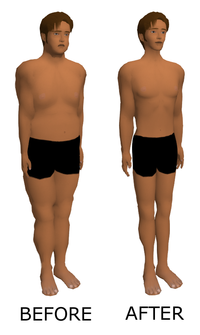
Photo from wikipedia
ABSTRACT Adolescents with attention-deficit/hyperactivity disorder (ADHD) are known to have stronger preferences for smaller immediate rewards over larger delayed rewards in delay discounting tasks than their peers, which has been… Click to show full abstract
ABSTRACT Adolescents with attention-deficit/hyperactivity disorder (ADHD) are known to have stronger preferences for smaller immediate rewards over larger delayed rewards in delay discounting tasks than their peers, which has been argued to reflect delay aversion. Here, participants performed a delay discounting task with gains and losses. In this latter condition, participants were asked whether they were willing to wait in order to lose less money. Following the core assumption of the delay aversion model that individuals with ADHD have a general aversion to delay, one would predict adolescents with ADHD to avoid waiting in both conditions. Adolescents (12–17 years) with ADHD (n = 29) and controls (n = 28) made choices between smaller immediate and larger delayed gains, and between larger immediate and smaller delayed losses. All delays (5–25 s) and gains/losses (2–10 cents) were experienced. In addition to an area under the curve approach, a mixed-model analysis was conducted to disentangle the contributions of delay duration and immediate gain/delayed loss amount to choice. The ADHD group chose the immediate option more often than controls in the gain condition, but not in the loss condition. The contribution of delay duration to immediate choices was stronger for the ADHD group than the control group in the gain condition only. In addition, the ADHD group scored higher on self-reported delay aversion, and delay aversion was associated with delay sensitivity in the gain condition, but not in the loss condition. In sum, we found no clear evidence for a general aversion to delay in adolescents with ADHD.
Journal Title: Child Neuropsychology
Year Published: 2019
Link to full text (if available)
Share on Social Media: Sign Up to like & get
recommendations!